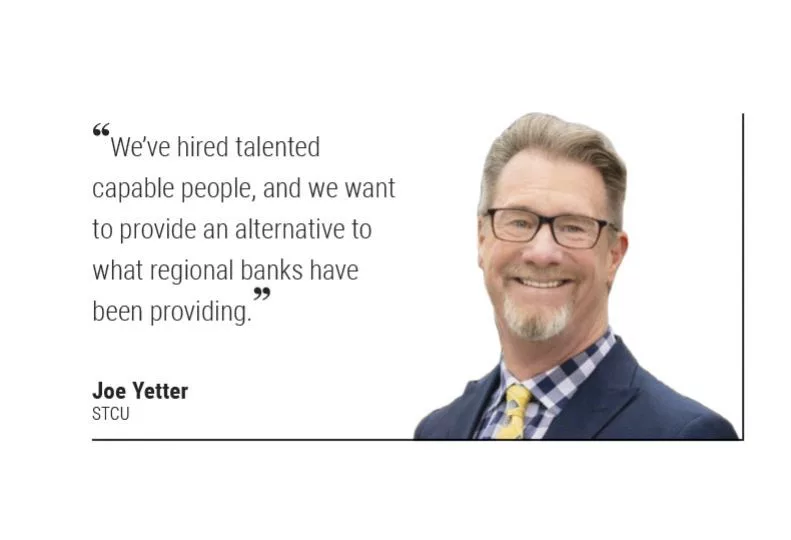
Home » Frankly, STCU expands its business banking services
Frankly, STCU expands its business banking services
Credit union rolls out new sister brand in campaign

June 22, 2023
STCU, the Liberty Lake-based credit union with branches in Washington and Idaho, has launched STCU Business, a sister brand that aims to expand business banking services.
STCU Business is led by three veterans of the financial services industry who are relatively new to the credit union, says Dan Hansen, communications strategist for STCU.
The leadership team includes Joe Yetter, senior vice president of commercial and banking services, who joined STCU in 2020; Curt Fuller, director of commercial business development, who joined the credit union last year; and Brian Read, chief financial retail officer, who joined the organization earlier this year.
STCU Business’s commercial banking division serves businesses above $2 million in annual revenue and those with more complex needs. Its business banking division serves businesses with up to $2 million in annual revenue and those with basic needs for banking, payroll, lending, and other services, says Read.
Yetter, who has over 30 years of commercial banking and lending experience, says, although the credit union has had business banking for years, the reason for the big reveal now is the credit union has built the primary products that businesses will need.
“Now we are positioned, we’ve hired talented capable people, and we want to provide an alternative to what regional banks have been providing,” says Yetter.
The creation of the new division now offers a more sophisticated line of services, says Dan Hansen, STCU communications strategist.
New products include expanded options for business credit cards, business checking, cash-management, merchant services, and payroll. STCU Business also offers point-of-sale services for in-store and mobile payments that work with Apple Pay, Google Pay, and other digital wallets.
STCU Business’s commercial loans can be used to finance owner-occupied and nonowner-occupied properties, construction projects, multifamily housing projects, and industrial equipment, Yetter says.
The credit union also plans to add agricultural lending to its portfolio of services, he adds.
In all, the dollars invested in the new divisions, including personnel, technology, and a new marketing campaign, is “easily a seven-figure sum,” says Read, though he declines to disclose a precise figure.
The message of the advertising campaign is: “Can I be Frank with you?” It features an actor in a business suit and refers to the credit union’s acknowledgment of its own shortcomings when it came to offering a full range of business services in the past, says Hansen.
“If you’ve seen those ads, they’re literally talking about how a while back, we weren’t ready to do this, so we’ve invested in those resources that we needed, and now we can meet (business) needs,” he says.
STCU was founded by schoolteachers as Spokane Teachers Credit Union in 1934 and is headquartered in Liberty Lake at 1620 N. Signal. It operates 38 branches across Washington and North Idaho, 22 of which are in the Spokane-Coeur d’Alene area. It will open its 39th branch in Moses Lake, Washington, in 2024.
STCU’s net income for the quarter ending March 31 was $11.7 million, a slight decrease from income of $12 million in the year-earlier quarter.
Loans totaled $4.7 billion as of March 31, an increase of $570 million from a year earlier. Of that loan total, the commercial banking portfolio currently has over $1 billion in loans, says Yetter.
Assets totaled $5.8 billion as of March 31, an increase of $750 million compared with total assets of $5 billion the year-earlier quarter.
Deposits totaled $4.6 billion as of March 31, an increase of $243 million from a year earlier.
Yetter credits Ezra Eckhardt, STCU’s president and CEO since 2016, for guiding the formation of STCU Business.
Up until the last decade or so, community banks often met business needs on a local scale. In recent years, however, some community banks have been consolidated into regional banks headquartered outside of the Spokane market, Yetter contends.
Eckart, who has a background in community banks, was familiar with the direction some were going, and saw an opportunity for STCU to expand its business banking services, Yetter says.
“Part of STCU being here for good, is finding a need, seeing a need, and fulfilling it,” he says.
Read, who also has a background working at community banks, agrees with Yetter.
“Banks have gotten bigger, and maybe as a function of their size, it’s more efficient for them to focus on bigger businesses,” he says. “Whether headquartered in the West Coast or nationally, and for a variety of reasons … big banks have made the decision to pull out of smaller markets.”
Since 2020, STCU has opened 13 branches, some of which are in rural communities that larger banks have vacated, says Hansen.
They include former Umpqua Bank branch acquisitions in 2020 in Medical Lake and Othello, Washington, and former Banner Bank branch acquisitions in 2022 in Colville and Kettle Falls, Washington, he says.
As STCU steps into these rural communities, it is also preparing to serve the farming community by offering agricultural lending, says Yetter.
“A lot of times, lenders are either all in on agricultural lending or all out,” he says. “We want to do it in a way in which we have relationship officers … that know the community.”
Latest News Special Report Banking & Finance
Related Articles
Related Products
Related Events


_web.webp?t=1769673727)
_web.webp?t=1769673728)
_web.webp?t=1769673735)
